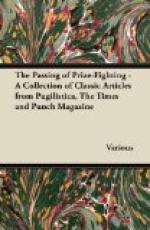* * * * *
In The Fairy Man (DENT), a most engrossing phantasy, Mr. L. COPE CORNFORD takes for raw material a family of Maida Vale, victims of all those petty, sordid, but deadly troubles known only to the middle class. Without warrant, explanation, or excuse he introduces into their routine a sudden touch of magic; the tired City man, the acid foster-mother, the children (mercifully devoid of any priggishness), and the pre-eminently human housemaid and cook are transplanted for a moment into the age of the knights-errant. Thither also are transplanted their special friends and enemies, all retaining their modern identities and their current troubles, and all getting unpleasantly involved in the troubles of the ancients, to boot. Eventually the interlude is found to have provided the solution of the difficulties, pecuniary and other, of the home in Maida Vale; and I will say no more than that a very telling story ends well and naturally. No reader should imagine he has read all this before; the admixture of fairy imagination with the intensely practical things of life is something new, and there is a definite purpose in it all. The book may be labelled intellectual, but the characters always remain very human; thus George, finding himself back in the times of a thousand years ago, says critically, “It looks old, but it feels just the same;” and his father, seeing him engaged in an assault on the castle, shouts, “George! put that sword down instantly.” Mr. CORNFORD makes his points with such discretion and understanding that even the most solid materialist must, after reading, feel a little less sure of himself.
* * * * *
I rather think that if I had the opportunity of discussing with ELINOR MORDAUNT her Old Wine in New Bottles (HUTCHINSON) and had the courage to say what was in my mind: “Don’t you think perhaps that your vigorous and unexpected characters are out of story-land rather than out of life?” and if she riposted, “But is it necessary they should be like life if they are life-like?” I should be left with no more effective retort than “Quite,” or something just as futile. For there’s no doubt that these queer villains, Chinese dealers, bold sailormen, travellers, rapt lovers, do get over the footlights in an effective way. They do the things that are only done in magazines, but they do them with a gusto which engages the attention. Perhaps indeed that’s what the author meant by her ingenious title; though I suppose her device of setting before each story a longer or shorter, more or less relevant, passage from the Old Testament gives a clearer clue to the precise way in which she interprets “nothing new under the sun.” I cheerfully prescribe of this old wine one or two bottles at bedtime. Better not, I think, the whole case at a sitting.
* * * * *
[Illustration: Tramp. “YES, MUM, I’M AN OLD SOLDIER; FOUGHT IN THE—”




